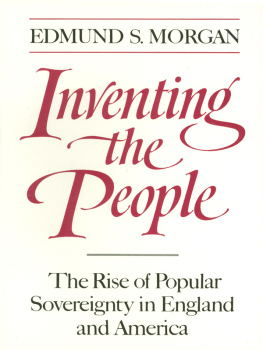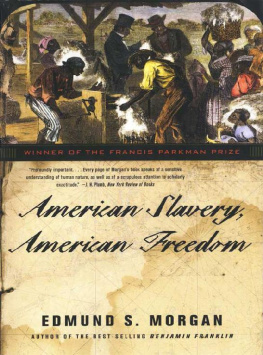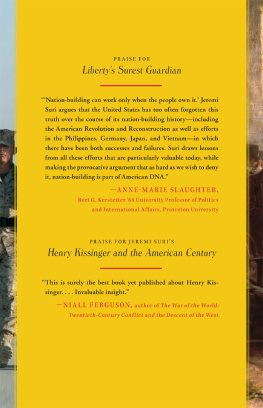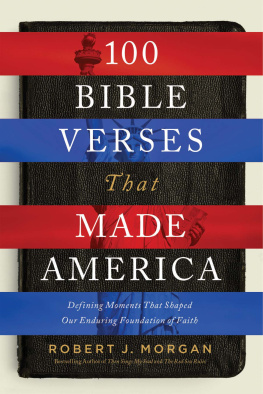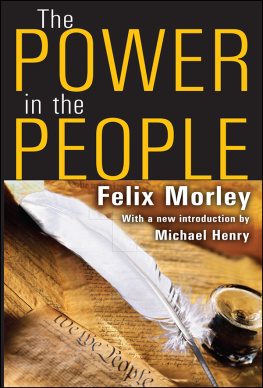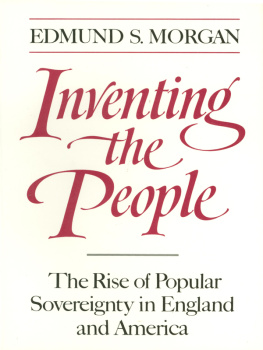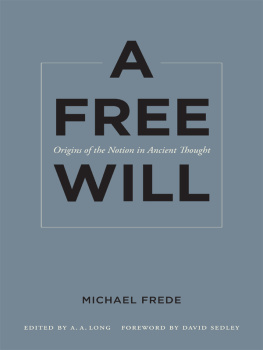
BY EDMUND S. MORGAN
The Puritan Family: Religion and Domestic Relations in Seventeenth-Century New England
Virginians at Home; Family Life in the Eighteenth Century
The Stamp Act Crisis: Prologue to Revolution (with Helen M. Morgan)
The Birth of the Republic
The Puritan Dilemma: The Story of John Winthrop
The Gentle Puritan: A Life of Ezra Stiles
Visible Saints: The History of a Puritan Idea
Roger Williams: The Church and the State
So What about History?
American SlaveryAmerican Freedom: The Ordeal of Colonial Virginia
The Genius of George Washington
The Challenge of the American Revolution
The Meaning of Independence: John Adams, George Washington, and Thomas Jefferson
EDITED WORKS
Prologue to Revolution: Sources and Documents on the Stamp Act Crisis
The Diary of Michael Wigglesworth: The Conscience of a Puritan
The Founding of Massachusetts: Historians and the Sources
The American Revolution: Two Centuries of Interpretation

For Marie
T HIS BOOK has been long in the making. Parts of it in earlier versions were presented and discussed at Cornell University (as the Carl Becker Lectures), at the Lionel Trilling Seminar of Columbia University, and at the Davis Center of Princeton University. I have tried to profit from the discussions on those occasions and also from readings by friends better informed than I. Linda Colley read the entire manuscript in a late draft and saved me from numerous blunders. And a number of scholars gave me good advice, not always heeded, about the first chapter: Paul Christianson, Jack Hexter, the late Joel Hurstfield, Barbara Malament, Conrad Russell, Lawrence Stone, and David Underdown. Probably no one of them would agree with the interpretation offered in it. Marie Caskey Morgan and James L. Mairs also read the entire manuscript and helped me to give it whatever clarity it possesses. Avery Hudson has been the kind of copy editor that every author hopes for. Finally I wish to thank the many librarians who have smoothed my way at the British Library, the Bodleian, the Virginia Historical Society and especially the Yale University Library and the Henry E. Huntington Library.
Parts of the second chapter were published in the Yale Review for April 1983 and are here reprinted with permission.
Origins

N OTHING IS MORE SURPRISING to those, who consider human affairs with a philosophical eye, than to see the easiness with which the many are governed by the few; and to observe the implicite submission with which men resign their own sentiments and passions to those of their rulers. When we enquire by what means this wonder is brought about, we shall find, that as Force is always on the side of the governed, the governors have nothing to support them but opinion. Tis therefore, on opinion only that government is founded; and this maxim extends to the most despotic and most military governments, as well as to the most free and most popular.
David Hume, Of the First Principles of Government, Essays and Treatises on Several Subjects, 1758 edition
W E MAY PERHAPS QUESTION today whether force is always on the side of the governed or even whether it always has been, but by and large Humes observation commands assent. Put it another way, all government rests on the consent, however obtained, of the governed. And over the long run mere force, even if entirely at the disposal of the governing few, is not a sufficient basis for inducing consent. Human beings, if only to maintain a semblance of self-respect, have to be persuaded. Their consent must be sustained by opinions.
The few who govern take care to nourish those opinions. No easy task, for the opinions needed to make the many submit to the few are often at variance with observable fact. The success of government thus requires the acceptance of fictions, requires the willing suspension of disbelief, requires us to believe that the emperor is clothed even though we can see that he is not. And, to reorder Humes dictum, the maxim extends to the most free and most popular governments as well as to the most despotic and most military. The popular governments of Britain and the United States rest on fictions as much as the governments of Russia and China.
Government requires make-believe. Make believe that the king is divine, make believe that he can do no wrong or make believe that the voice of the people is the voice of God. Make believe that the people have a voice or make believe that the representatives of the people are the people. Make believe that governors are the servants of the people. Make believe that all men are equal or make believe that they are not.
The political world of make-believe mingles with the real world in strange ways, for the make-believe world may often mold the real one. In order to be viable, in order to serve its purpose, whatever that purpose may be, a fiction must bear some resemblance to fact. If it strays too far from fact, the willing suspension of disbelief collapses. And conversely it may collapse if facts stray too far from the fiction that we want them to resemble. Because fictions are necessary, because we cannot live without them, we often take pains to prevent their collapse by moving the facts to fit the fiction, by making our world conform more closely to what we want it to be. We sometimes call it, quite appropriately, reform or reformation, when the fiction takes command and reshapes reality.
Although fictions enable the few to govern the many, it is not only the many who are constrained by them. In the strange commingling of political make-believe and reality the governing few no less than the governed many may find themselves limitedwe may even say reformedby the fictions on which their authority depends. Not only authority but liberty too may depend on fictions. Indeed liberty may depend, however deviously, on the very fictions that support authority. That, at least, has been the case in the Anglo-American world; and modern liberty, for better or for worse, was born, or perhaps we should say invented, in that world and continues to be nourished there.
Because it is a little uncomfortable to acknowledge that we rely so heavily on fictions, we generally call them by some more exalted name. We may proclaim them as self-evident truths, and that designation is not inappropriate, for it implies our commitment to them and at the same time protects them from challenge. Among the fictions we accept today as self-evident are those that Thomas Jefferson enshrined in the Declaration of Independence, that all men are created equal and that they owe obedience to government only if it is their own agent, deriving its authority from their consent. It would be difficult, if not impossible, to demonstrate these propositions by factual evidence. It might be somewhat easier, by the kind of evidence we usually require for the proof of any debatable proposition, to demonstrate that men are not created equal and that they have not delegated authority to any government. But self-evident propositions are not debatable, and to challenge these would rend the fabric of our society.
It is not the purpose of this book to challenge them, and my use of the word fiction has no such intention. I have been troubled by the pejorative connotations attached to the word, but I have been unable to find a better one to describe the different phenomena to which I have applied it. I can only hope that readers who persevere to the end of the book will recognize that the fictional qualities of popular sovereignty sustain rather than threaten the human values associated with it. I hope they will also recognize that I do not imply deception or delusion on the part of those who employed or subscribed to the fictions examined here, fictions in which they
Next page
